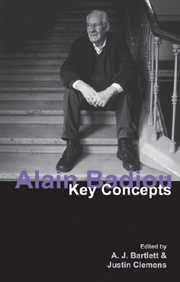Book contents
- Frontmatter
- Contents
- Contributors
- Acknowledgements
- Abbreviations
- Miscellaneous Frontmatter
- Introduction: Badiou's form
- 1 Biography and early works
- PART I THE FOUNDATIONS OF BADIOU'S THOUGHT
- PART II BADIOU'S KEY CONCEPTS OR “CONDITIONS”
- PART III BADIOU'S ENGAGEMENT WITH KEY PHILOSOPHERS
- Afterword: Badiou's futures
- Bibliography
- Index
1 - Biography and early works
- Frontmatter
- Contents
- Contributors
- Acknowledgements
- Abbreviations
- Miscellaneous Frontmatter
- Introduction: Badiou's form
- 1 Biography and early works
- PART I THE FOUNDATIONS OF BADIOU'S THOUGHT
- PART II BADIOU'S KEY CONCEPTS OR “CONDITIONS”
- PART III BADIOU'S ENGAGEMENT WITH KEY PHILOSOPHERS
- Afterword: Badiou's futures
- Bibliography
- Index
Summary
How can a life correspond to a proper name when that life is incomplete, its vicissitudes not exhausted, its past forever open before it? How does a mortal's life correspond to a proper name when the name itself marks the desire for immortality? And if a mortal life has intersected more than one subject – in the Badiouean sense of the term – and if each subject is properly infinite, then what possible correspondence can be written out between one name and a life? Only a correspondence of personae, of heteronyms.
First persona: the teacher, the master. A graduate student spends a year researching his doctorate in Paris, sits in on three notorious seminars. To distinguish the lecturers he disposes of three variables, each with two values: starts late or not, dresses up or down, audience rich or poor. One starts late, dresses up and the audience is rich; another starts late, dresses up, and the audience is rich; the other starts late, dresses down and the audience is poor – which one was Miller, which Derrida, and which Badiou? Badiou avows having encountered three masters in his youth: Sartre, Althusser and Lacan, but in each text he engages in a progressive multiplication of masters: Mao and Mallarmé, Hegel and Pascal, Canguilhem, Cavaillès and Lautman, Cantor and Cohen, not to mention the seven poets of the Manifesto for Philosophy's “Age of Poetry”.
- Type
- Chapter
- Information
- Alain BadiouKey Concepts, pp. 8 - 10Publisher: Acumen PublishingPrint publication year: 2010

